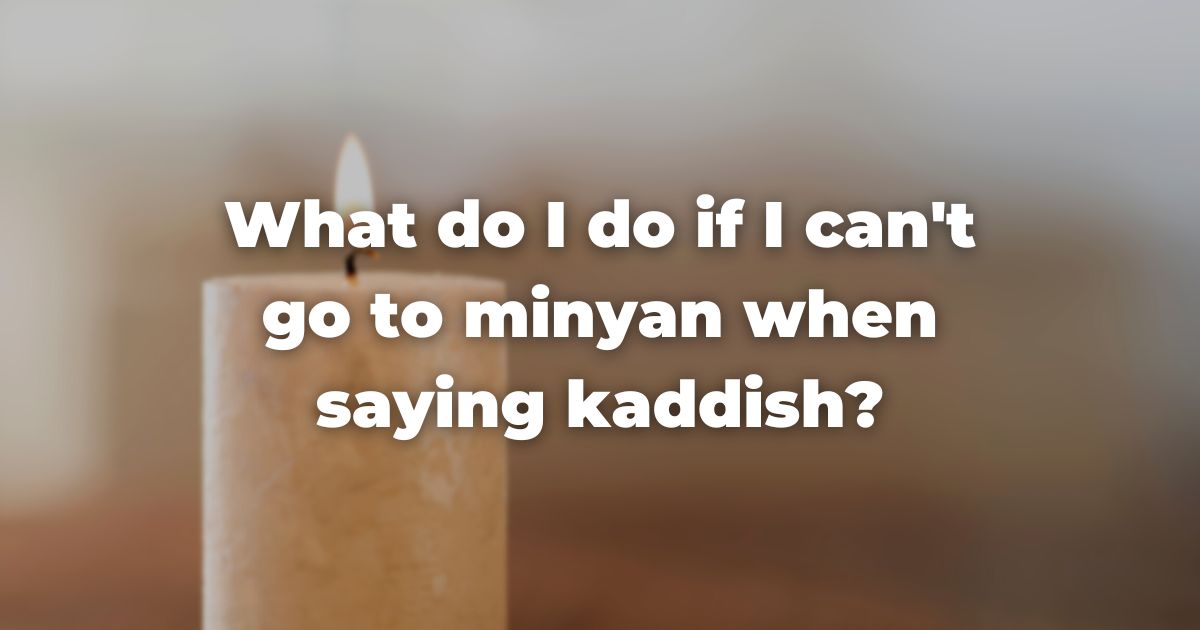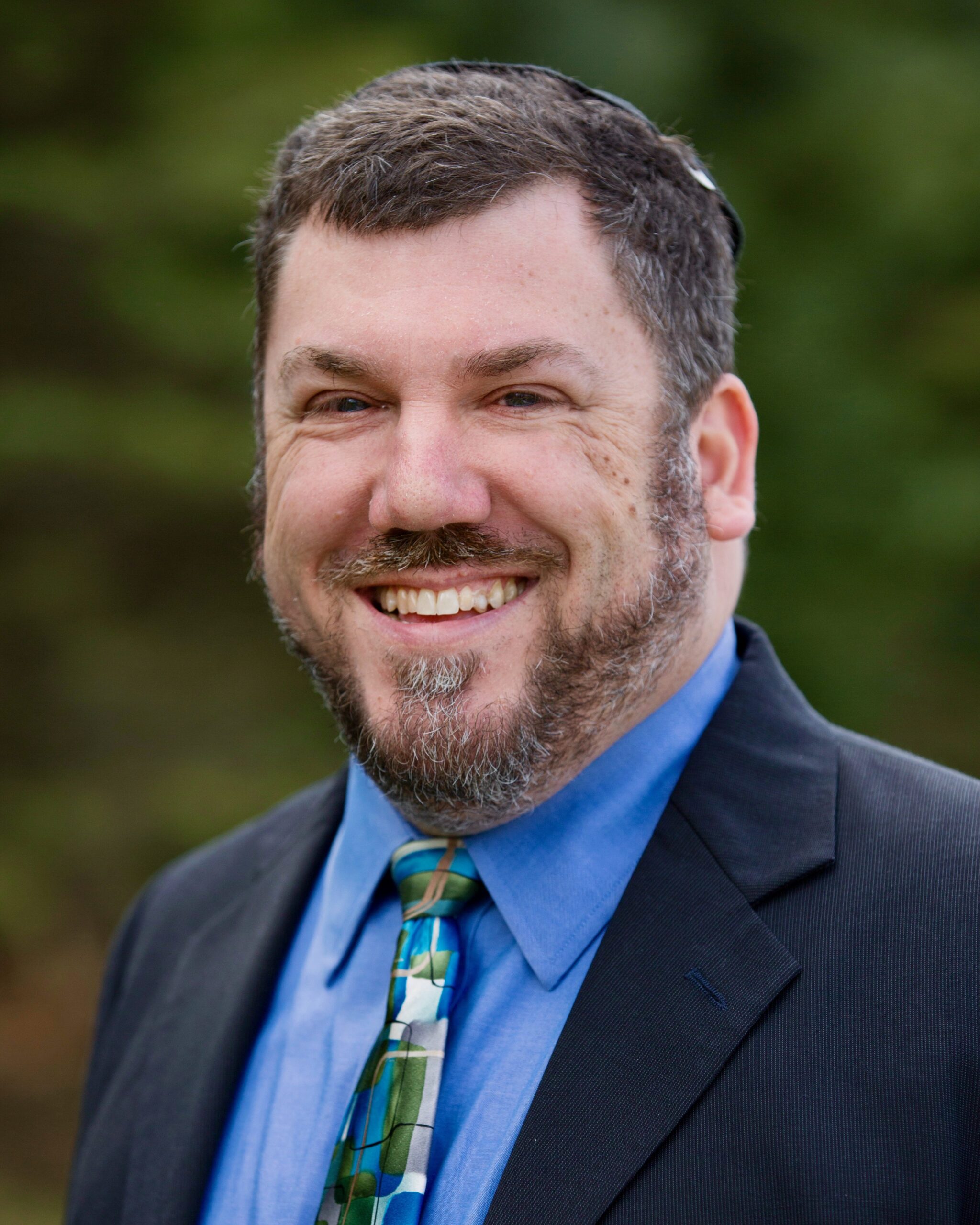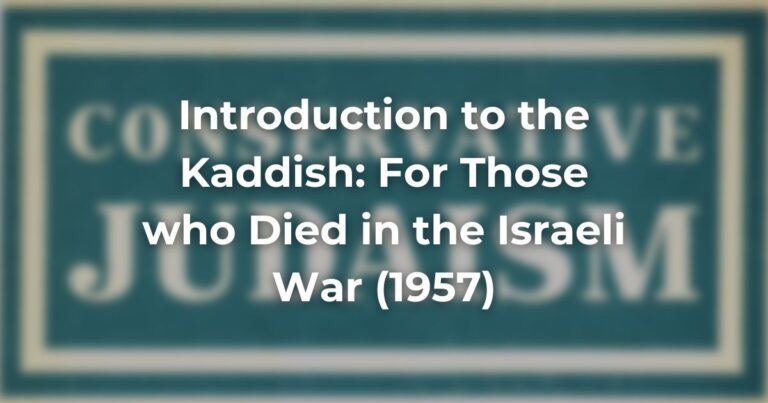What do I do if I cannot attend minyan when I am saying kaddish for a family member?
I can’t get to a minyan to say Kaddish!
Many people have been in the situation where the anniversary of a relative or friend (yarhtzeit in Yiddish) comes up, and they cannot be in a minyan (a group of ten or more Jewish adults) in order to say the Mourner’s Kaddish for their loved one. Perhaps they don’t live near a synagogue that has a minyan to go to, or they don’t feel comfortable in the minyans in their area, or they cannot due to scheduling issues.
Why do we say the Mourner’s Kaddish?
In general, Kaddish began as a way to mark the end of either a prayer service or a study session, namely by praising God’s name in a number of ways, affirming God’s goodness and the world’s goodness, and ending with a prayer for peace.
In the rabbinic period, a sage and their students would conclude learning sessions by saying Kaddish, and after a sage died, their students would gather to learn in their teacher’s memory, and they would conclude with Kaddish as well. At some point, the learning aspect of this practice became less common, but saying Kaddish for the deceased remained.
Thus was born the custom of saying Kaddish for a loved one, including a teacher or mentor, which became cemented as a Jewish practice after the First Crusade in Europe in the early 12th century.
Another reason that we say Kaddish for a loved one is that an aspect of the Rabbi’s view of the afterlife was that after death, the soul ascends to God, and that meritorious acts done on behalf of the deceased help their soul ascend.
Being in the presence of the community and affirming God’s goodness was one of those meritorious acts, and over time became the most ubiquitous communal ways to remember our loved ones and generate merit on their behalf.
The Big Idea Behind Mourner’s Kaddish
The big idea is that saying Kaddish was a way for those students to remember their teacher in a way that would bring merit to their teacher and was meaningful to them.
But if one cannot get to a minyan to say Kaddish for them, there are other things that one can do that are meritorious and meaningful.
Torah Lishmah: Do Torah Study
One could set aside time on that day or on a day near their yahrzeit to do some TorahRefers to the first five books of the Hebrew Bible, the Tanakh, also called the Five Books of Moses, Pentateuch or the Hebrew equivalent, Humash. This is also called the Written Torah. The term may also refer to teachings that expound on Jewish tradition. Read more study. The choice of material is completely up to the individual. Some people make a point of studying MishnahA collection of rabbinic teachings edited in Israel around 225 CE. Organized in six sedaraim by subject matter and dealing with both ritual and civil law. Both the Jerusalem and Babylonian Talmud are expansive discussions of the Mishnah. Read more. Some might study the weekly Torah portion.
One could study a Jewishly related subject that was important to the person they are commemorating, whether it is using traditional Jewish texts or a more contemporary Jewish book. One could do the Torah study on their own, or one could arrange to do the study with friends and family, either locally on using a videoconferencing app.
Tikkun Olam: Make the World a Better Place
One could devote some of their resources, either time, treasure or talent in memory of their loved one. Perhaps it could be a project or cause that was important to that person.
Perhaps it could be something done for the community in which that person lived. Perhaps there was a fund that was mentioned as a place to make donations in their memory after they died. Or one could simply find a cause or need locally that is meaningful to them and dedicate that effort to their memory.
Take on a Mitzvah: Increase one Jewish observance
Another way that one could act in a meaningful and meritorious way is to take one’s observance up a notch in memory of the deceased.
Perhaps it could be an aspect of Jewish ritual observance that was significant to the person being remembered, such as praying daily in some form, increasing one’s practice of kashrut in some way, adding to one’s Shabbat or Festival observance.
Perhaps it could be something that one does for a set period of time, such as a few weeks, months or even indefinitely.
There are many ways to remember and honor our loved ones
Saying Kaddish for a loved one is a cherished and prized custom, but it is not the only way to remember and honor their lives. The most important thing is to act in such a way that brings more love, goodness and compassion into the world.
Author
-

Rabbi Andrew Pepperstone meets people where they are, balances tradition and innovation, and cultivates many pathways into Jewish living. Currently serving Ahavath Achim Congregation in Wichita, KS, he has worked in many settings: congregations, youth groups, adult education, and day school. Rabbi Pepperstone is also involved in rabbinic professional development, interfaith dialogue, and social justice. Ordained by JTS in 2002, he also holds a BA in Linguistics with a Minor in Hebrew from USCD. In addition, Rabbi Pepperstone is a cook and baker, board game enthusiast, Hebrew grammar guru, stand-up comedy aficionado, Star Wars expert, and pop culture trivia master.
View all posts






